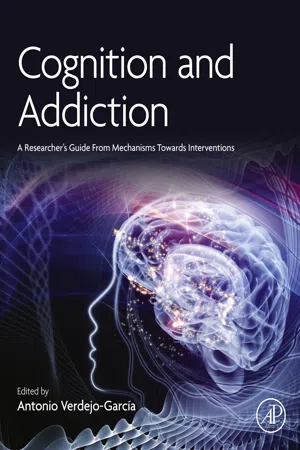
Cognition and Addiction
A Researcher's Guide from Mechanisms Towards Interventions
- 442 pages
- English
- ePUB (mobile friendly)
- Available on iOS & Android
Cognition and Addiction
A Researcher's Guide from Mechanisms Towards Interventions
About this book
Cognition and Addiction: A Researcher's Guide from Mechanisms Towards Interventions provides researchers with a guide to recent cognitive neuroscience advances in addiction theory, phenotyping, treatments and new vistas, including both substance and behavioral addictions. This book focuses on "what to know and "how to apply information, prioritizing novel principles and delineating cutting-edge assessment, phenotyping and treatment tools. Written by world renowned researcher Antonio Verdejo-Garcia, this resource will become a go-to guide for researchers in the field of cognitive neuroscience and addiction.- Examines cognitive neuroscience advances in addiction theory, including both substance and behavioral addictions- Discusses primary principles of cutting-edge assessment, phenotyping and treatment tools- Includes detailed chapters on neuro-epidemiology and genetic imaging
Frequently asked questions
- Essential is ideal for learners and professionals who enjoy exploring a wide range of subjects. Access the Essential Library with 800,000+ trusted titles and best-sellers across business, personal growth, and the humanities. Includes unlimited reading time and Standard Read Aloud voice.
- Complete: Perfect for advanced learners and researchers needing full, unrestricted access. Unlock 1.4M+ books across hundreds of subjects, including academic and specialized titles. The Complete Plan also includes advanced features like Premium Read Aloud and Research Assistant.
Please note we cannot support devices running on iOS 13 and Android 7 or earlier. Learn more about using the app.
Information
Cognition
the interface between nature and nurture in addiction
Abstract
Keywords
Introduction
Cognition to bridge the gap between neurobiological models and social accounts of addiction
Table of contents
- Cover image
- Title page
- Table of Contents
- Copyright
- Dedication
- Contributors
- Biographies
- Foreword
- Acknowledgments
- Introduction
- Chapter 1. Cognition: the interface between nature and nurture in addiction
- Chapter 2. From impulses to compulsions
- Chapter 3. Dual models of drug addiction: the impaired response inhibition and salience attribution model
- Chapter 4. Decision-making deficits in substance use disorders: cognitive functions, assessment paradigms, and levels of evidence
- Chapter 5. Social cognition in addiction
- Chapter 6. A neurocognitive model of the comorbidity of substance use and personality disorders
- Chapter 7. Cognitive risk factors for alcohol and substance addictions
- Chapter 8. Neuropsychological deficits in alcohol use disorder: impact on treatment
- Chapter 9. Tobacco addiction: cognition, reinforcement, and mood
- Chapter 10. Cognitive sequelae of cannabis use
- Chapter 11. Cognitive deficits in people with stimulant use disorders
- Chapter 12. Cognitive consequences of 3,4-methylenedioxymethamphetamine use
- Chapter 13. Cognitive consequences of opioid use
- Chapter 14. Predictors of problem gambling and other addictive behaviors: from context to genes
- Chapter 15. Cognitive factors in gambling disorder, a behavioral addiction
- Chapter 16. Cognitive factors associated with gaming disorder
- Chapter 17. Cognitive bias modification in the treatment of addiction
- Chapter 18. Peer-reviewed working memory training: is it an effective intervention for addiction?
- Chapter 19. Inhibitory control training
- Chapter 20. Goal-based interventions for executive dysfunction in addiction treatment
- Chapter 21. Neurocognitive mechanisms of mindfulness-based interventions for addiction
- Chapter 22. Brain stimulation as an emerging treatment for addiction
- Chapter 23. Pharmacological cognitive enhancers
- Chapter 24. Cognitive research on addiction in a changing policy landscape
- Chapter 25. Population neuroscience in addiction research
- Chapter 26. Drug use and self-awareness of treatment need: an exemplar of how population-based survey studies can address questions relevant to the neuroscience of insight
- Chapter 27. Genetics, imaging, and cognition: big data approaches to addiction research
- Chapter 28. Modeling neurocognitive and neurobiological recovery in addiction
- Chapter 29. Clinical translation and implementation neuroscience for novel cognitive interventions in addiction medicine
- Chapter 30. Synergistic opportunities in combined interventions for addiction treatment
- Index